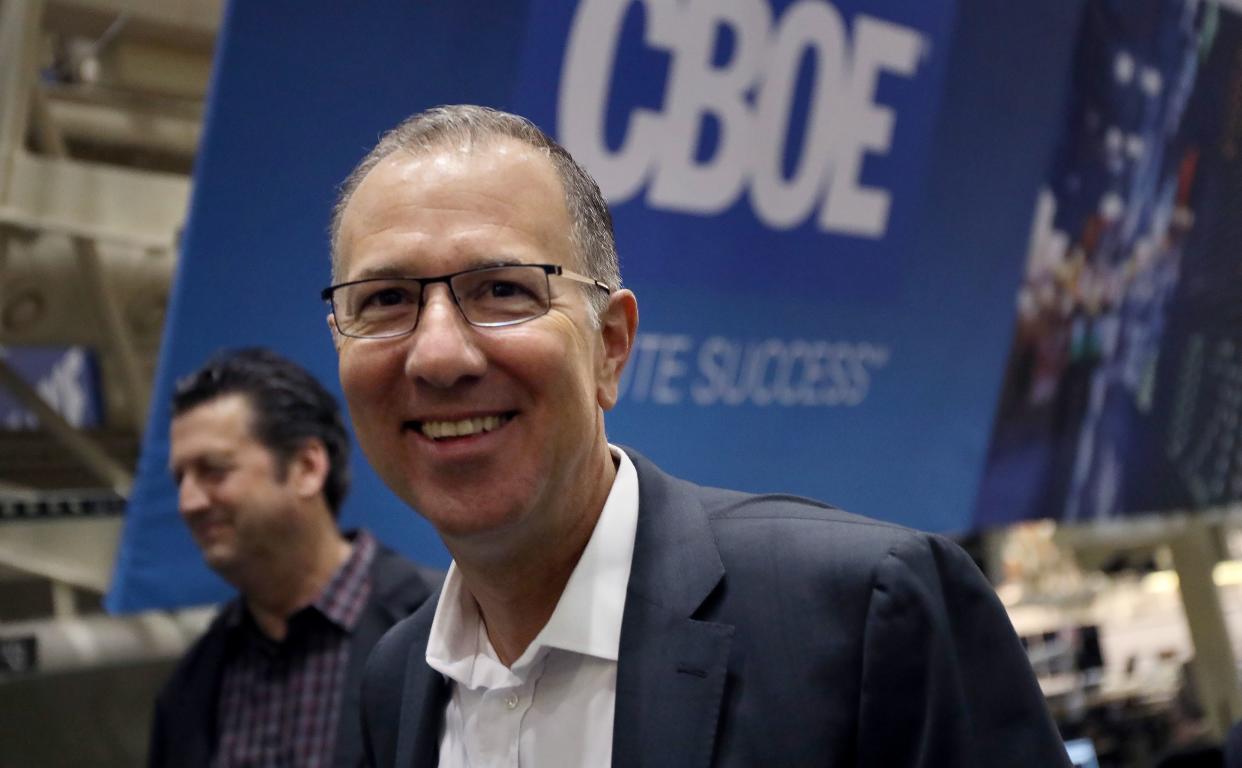Editorial: The Ed Tilly scandal at the Cboe is bad news for Chicago

Ed Tilly started as a trader at the Chicago Board Options Exchange in 1987 and worked his way up to chief executive officer. Under his decadelong stewardship, the exchange grew dramatically, and it was having a banner year until Tuesday, when Tilly’s Chicago success story ended abruptly.
Knowledgeable, popular among trading professionals and one of the most recognizable faces of his industry, Tilly resigned under pressure after an internal investigation found he had undisclosed personal relationships with colleagues.
And just like that, Chicago lost one of the anchors keeping a bobbling industry in place.
Cboe’s stock rose on the news of Tilly’s abrupt departure, not because he had been doing a bad job, but rather on the theory that his replacement, a 68-year-old board member named Frederic Tomczyk, will not be as committed to keeping the exchange independent and based in its native city.
Tomczyk gets a big equity award if he remains CEO for just one year, according to Cboe’s public filings, and it’s easy to imagine him fielding calls from rivals to sell the exchange within that approximate time frame.
CME Group would be a likely buyer, which would keep Cboe in Chicago for as long as CME stays, but, leaving aside antitrust concerns, Atlanta-based rival ICE is just as capable of stepping up. The U.S. options industry has always had a strong connection to New York financial giants as well, and don’t rule out foreign bidders, either.
Against this backdrop — a perilous moment for an iconic employer born and bred in Chicago — Mayor Brandon Johnson continues his hunt for deep pockets to pick.
A much-discussed “transaction tax” may prove irresistible to a political neophyte staring at a budget hole and looking ahead to whatever sweetheart deal his pals at the Chicago Teachers Union will be demanding from him soon.
Johnson owes a debt to the union, his former employer, which did more than any other group to put him in office. And while he should be laying the groundwork for seeking concessions from the teachers, given the city’s poor budget outlook, if he follows the long-standing Illinois tradition of paying off political allies, he will need big bucks to make good on his promises.
Mayor, now is the time to declare a transaction tax off the table. Say it loud and clear.
Chicago cannot afford to lose one of its most lucrative industries, and the city needs to make a decisive statement that retaining its exchanges and trading firms is a top priority. Practically nothing — not even the ongoing threat of crime downtown — would drive away these financially savvy players faster than a money grab from a city administration they have no reason yet to trust.
The so-called LaSalle Street tax is not an invention of the Johnson administration. The financial industry has labored under the threat of such a tax for years. But never has it seemed more likely than from a mayor whose allies produced the infamous “first we get the money” memo outlining plans to soak the city’s most productive citizens.
Consider this inconvenient truth for Johnson: Financial exchanges process their transactions on computer servers that can function in locales distant from wherever their top executives happen to live. Taxing those transactions in one place is an invitation to move them elsewhere.
Politicians and public employee unions never seem to learn that killing the goose means no more golden eggs. They tend to live in denial of data’s mobility, even though exchanges have proved in trial runs they can comfortably relocate to tax-friendly locales. And, of course, it’s not just exchanges that travel easily. Did we learn nothing from the exit of Ken Griffin and Citadel to Miami?
In 2020, New Jersey got serious about imposing a transaction tax, and Illinois was among the many states readying incentives to lure the financial firms that would have eagerly relocated. As this page said at the time, it was a cost-free lesson in how foolish our state and local officials would be to follow New Jersey’s failed strategy.
Chicago businesses already operate under a high tax burden, making it difficult to attract new employers and workers, an issue compounded by the broadly held perception that the city is increasingly unsafe. Under Tilly, Cboe recently defied expectations and just last year opened a new state-of-the-art trading floor in the Chicago Board of Trade building at the foot of LaSalle Street. At the time, Tilly proudly professed his affection for his home city.
Mayor, Tilly’s out.
Not your fault. But keep putting a target on their backs for your latest tax schemes, and one way or another, many more of the city’s most loyal movers and shakers could be gone before you know it. And good luck coaxing them back.
Join the discussion on Twitter @chitribopinions and on Facebook.
Submit a letter, of no more than 400 words, to the editor here or email letters@chicagotribune.com.

